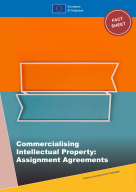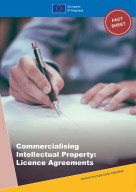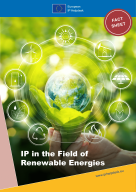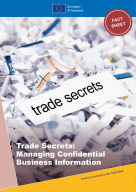A geographical indication (GI) is an intellectual property right that safeguards the name of a product linked to a specific geographical origin, where its reputation or qualities are essentially attributable to that origin.This fact sheet provides an overview of the key aspects of GIs in the EU.
European IP Helpdesk team published a new fact sheet which focuses on joint ventures and puts forward some practical and legal issues, mainly from the perspective of the ownership and exploitation of intellectual property.
Spin-off, also known as “spin-out” are entities intended as a separate legal entity created by a parent organisation (PO) to exploit its IP assets. This fact sheet deals with the creation and management of spin-offs as instruments for the commercialisation of intellectual property (IP) rights.
The European IP Helpdesk, in partnership with the Latin America IP SME Helpdesk, has released a fact sheet. This document offers a comprehensive comparison of key aspects of intellectual property rights between Europe and Chile.
Joining forces with the Latin America IP SME Helpdesk, European IP Helpdesk published a fact sheet "IP Systems Comparative: Brazil vs Europe" focusing on different aspects of intellectual property rights in Europe vs Brazil.
The Latin America IP SME Helpdesk and the European IP Helpdesk have jointly published a fact sheet providing a broad comparison of key features of intellectual property rights between Europe and Colombia.
In collaboration with the Latin America IP SME Helpdesk, the European IP Helpdesk has published a fact sheet titled "IP Systems Comparative: Mexico vs Europe." This resource provides an in-depth comparison of various aspects of intellectual property rights between Europe and Mexico.
With this fact sheet we aim to guide you through the essential actions to secure your trademark rights after registration. Whether you are an emerging startup or an established business, protecting your brand is not just a choice; it is a strategic necessity in today‘s competitive marketplace.

Nowadays, social media platforms are an essential instrument for many small and mediumsized enterprises (SMEs).

This fact sheet deals with the assignment of Intellectual Property (IP) rights. An assignment can be beneficial in many business circumstances.

Undoubtedly, licensing is one of the most common pathways to turn intellectual property (IP) into profit and transferring knowledge between different parties – be it from a research organisation to a company or from one business entity to another.

The successful development and commercialisation of technology requires a carefully integrated dispute resolution strategy as a key factor in securing the value of technologies and associated intellectual property (IP) rights developed in research and development (R&D) collaborations and their subse

Europe is home to some of history’s most important textile and fashion inventions and a number of the most celebrated designers, manufacturers, innovators and artists, such as Coco Chanel, Giorgio Armani and Christian Dior, to name a few.

Renewable energy is energy from sources that do not diminish or that can be replenished.

Trademarks might be one of the best-known Intellectual Property Rights (IPR).

On 15 April 2019, the European Council approved the Directive on Copyright and Related Rights in the Digital Single Market.

Intellectual property (IP) can be protected by formal IP rights such as trademarks or patents.

Copyright is an intellectual property right (IPR) that grants authors, artists and other creators protection for their literary, artistic and scientific creations, generally referred to as “works”.

The Internet has created plenty of opportunities for small and medium-sized enterprises (SMEs) as it has revolutionised the dynamics of international commerce and is an excellent means to boost brand visibility.

Risks of investing in non-original design or filing an application for identical or confusingly similar design can be avoided or at least limited by performing design searching.

Many people confuse the concepts of the ownership of Intellectual Property (IP) and the inventorship or authorship of creations, or sometimes they are simply not aware of their different nature.

Intellectual property (IP) assets such as patents, trademarks, copyrights or trade secrets are increasingly the core of many organisations and transactions.

Joint ownership often arises in connection with collaborative innovation and is of particular relevance to EU-funded programmes, joint ventures and more generally to any research project entailing the co-development of intellectual property (IP).

Oftentimes significant research or business information might not fall within the scope of protection provided by traditional intellectual property (IP) rights such as patents or copyright.

Non-disclosure agreements (NDAs), otherwise called confidentiality agreements, are private contracts through which valuable information is kept safe.
